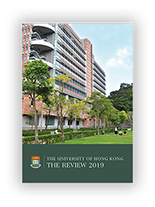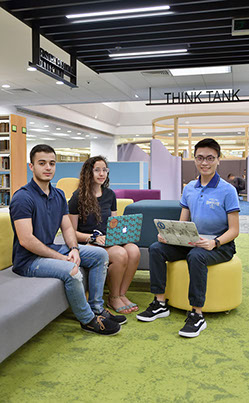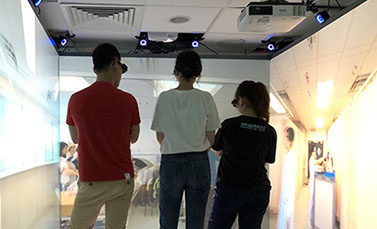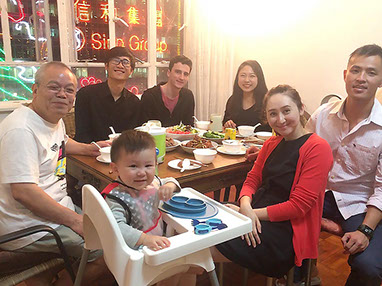Teaching and Learning
2018_%20.png?crc=3873734352)
PDF Version
Past Issues
Vision and Mission
An Extract from
the University’s
Annual Accounts 2018–19
The University Profile
Officers of the University
The Court
Teaching and Learning
Research and Innovation
Knowledge Exchange and
Technology Transfer
Message from the
President and
Vice-Chancellor
E-Book

Creative Approaches
Experimentation has taken hold among HKU’s educators, with the launch of innovative new majors, teaching techniques and initiatives to help local and non-local students integrate on campus.
BASc in the Limelight
HKU’s new Bachelor of Arts and Sciences (BASc) programme found ready takers among students attracted to its interdisciplinary education, training in leadership, big data and critical thinking, and its focus on the key developments of our times.
Emad Akhras, who is originally from Syria and lived and studied in the UK, is enrolled in the BASc in Applied Artificial Intelligence programme. “The interdisciplinary aspect is truly fascinating. I had been thinking it would be extremely dull to pursue either an abstract science course or a purely humanities-oriented course and I could not find the right balance until I saw the BASc. It offers me rich scientific content related to what I am interested in doing in the future, as well as a powerful foundation in literary and background theories,” he said.
Gitanjali Pies is enrolled in the generalist BASc. “What stood out for me is the flexibility it offers to study a wide range of subjects and ‘personalise’ my major. I also like that I am allowed to double major in another field of interest, such as economics or psychology. That way I can study deeper into one area once I find that passion,” she said.
Kelvin Cheung was motivated to enrol in the BASc in Global Health and Development programme by the broad perspectives taken on a subject of deep interest to him. “Global health is a complex phenomenon that cannot be viewed from a solely scientific and medical perspective. It requires an awareness of how economics, law, politics and human rights are intrinsically linked to health,” he said.

(From left) Emad Akhras, Gitanjali Pies and Kelvin Cheung from the new Bachelor of Arts and Sciences (BASc) programme.
Standing in Another’s Shoes, Virtually

Virtual reality (VR) tools are used for nursing education to help students understand the patient’s perspective.
What does it feel like to have a psychotic episode? The symptoms may be gleaned from a textbook, but written words cannot replicate the auditory and visual hallucinations and delusional thoughts that these patients undergo. Recognising the limitation this presents to caregivers, the School of Nursing has worked with HKU’s Technology-Enriched Learning Initiative (TELI) to develop virtual reality (VR) tools that let students see and hear the world from the perspective of patients.
Dr Janet Wong Yuen-ha, who oversaw the project, said: “VR education can integrate cognition, emotion and sensation into the learning process, which is very useful for nursing education, so we have applied it to depict the journeys of psychiatric patients suffering from psychosis, anxiety disorder and mood disorder.”
Fifth-year BNurs student Christy Chan Hei-yin felt both students and patients benefit from this form of learning. “After using VR, we can really experience how a patient feels – it is hard to differentiate hallucinations from reality. If we have more empathy towards patients and put ourselves in their shoes, and try to think from their perspective, patients will see that we, as nurses, really care about them and would like to help them. This will benefit the treatment process,” she said.
Table Talk
Internationalisation on campus can be tricky. Putting people together in the same place does not guarantee they will interact. The Centre of Development and Resources for Students (CEDARS) therefore has been developing programmes to help local and non-local students bridge the cultural gap.
The newest is CHATnCHILL, in which local students lead non-local students on short excursions to Hong Kong sites and culture. Leo Dai Chun-kit, a fourth-year BEcon&Fin student, has led visits to the Peak and the Tai Kwun arts and heritage centre. “A large part of our work is making conversation because we want to create a relaxing environment where international students have a chance to talk with local students and each other. I have met a lot of people from different countries and I have learned that relationship-building depends on letting other people understand you, even if you are not speaking in your mother tongue,” he said.
The Eat To-Gather programme, which started three years ago, pairs a local and two non-local students, who enjoy a meal with a local family to experience ordinary Hong Kong life. The local student helps the other students understand local etiquette and customs. Ivan Ng Chak-ming, a second-year student of Bachelor of Science in Actuarial Science, was the local contact for a group that dined with a fireman and his family. “The best part was the friends I made, I still see one of them regularly to just chat or play squash,” he said. That friend is Vincent Antonozzi, a second-year BEcon&Fin student who came to HKU from France. “We had a great dinner and there was good communication between all of us, which made this experiment enriching for everyone,” he said. CEDARS also organises peer language tutoring and other programmes to help students connect with each other.

The Eat To-Gather programme pairs a local and two non-local students, who enjoy a meal with a local family.